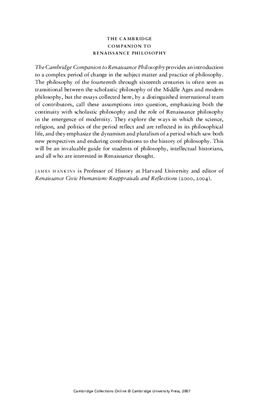Editor - James Hankins. Cambridge University Press, 2007, 412
pp.
The Cambridge Companion to Renaissance Philosophy provides an introduction to a complex period of change in the subject matter and practice of philosophy. The philosophy of the fourteenth through sixteenth centuries is often seen as transitional between the scholastic philosophy of the Middle Ages and mode philosophy, but the essays collected here, by a distinguished inteational team of contributors, call these assumptions into question, emphasizing both the continuity with scholastic philosophy and the role of Renaissance philosophy in the emergence of modeity. They explore the ways in which the science, religion and politics of the period reflect and are reflected in its philosophical life, and they emphasize the dynamism and pluralism of a period which saw both new perspectives and enduring contributions to the history of philosophy. This will be an invaluable guide for students of philosophy, intellectual historians, and all who are interested in Renaissance thought.
Contents: The philosopher and Renaissance culture, Humanism scholasticism and Renaissance philosophy, Continuity and change in the Aristotelian tradition, The revival of Platonic philosophy, The revival of Hellenistic philosophies, Arabic philosophy and Averroism, Philosophical prescriptions, Philosophy and the crisis of religion, Hispanic scholastic philosophy, New visions of the cosmos, Organizations of knowledge, Humanistic and scholastic ethics, The problem of the prince, The significance of Renaissance philosophy, Brief biographies of Renaissance philosophers, Nicholas of Cusa and mode philosophy, Lorenzo Valla and the rise of humanist dialectic, The immortality of the soul.
Книга будет интересна тем, кто только приступает к изучению философии эпохи европейского Возрождения; книга хорошо структурирована и не ограничивается скучным пересказом биографий и трудов и может быть использована как полноценное учебное пособие при изучении университетского курса ренессансной философии. Книга завершается шестидесятистраничной библиографией и подробным указателем.
The Cambridge Companion to Renaissance Philosophy provides an introduction to a complex period of change in the subject matter and practice of philosophy. The philosophy of the fourteenth through sixteenth centuries is often seen as transitional between the scholastic philosophy of the Middle Ages and mode philosophy, but the essays collected here, by a distinguished inteational team of contributors, call these assumptions into question, emphasizing both the continuity with scholastic philosophy and the role of Renaissance philosophy in the emergence of modeity. They explore the ways in which the science, religion and politics of the period reflect and are reflected in its philosophical life, and they emphasize the dynamism and pluralism of a period which saw both new perspectives and enduring contributions to the history of philosophy. This will be an invaluable guide for students of philosophy, intellectual historians, and all who are interested in Renaissance thought.
Contents: The philosopher and Renaissance culture, Humanism scholasticism and Renaissance philosophy, Continuity and change in the Aristotelian tradition, The revival of Platonic philosophy, The revival of Hellenistic philosophies, Arabic philosophy and Averroism, Philosophical prescriptions, Philosophy and the crisis of religion, Hispanic scholastic philosophy, New visions of the cosmos, Organizations of knowledge, Humanistic and scholastic ethics, The problem of the prince, The significance of Renaissance philosophy, Brief biographies of Renaissance philosophers, Nicholas of Cusa and mode philosophy, Lorenzo Valla and the rise of humanist dialectic, The immortality of the soul.
Книга будет интересна тем, кто только приступает к изучению философии эпохи европейского Возрождения; книга хорошо структурирована и не ограничивается скучным пересказом биографий и трудов и может быть использована как полноценное учебное пособие при изучении университетского курса ренессансной философии. Книга завершается шестидесятистраничной библиографией и подробным указателем.

